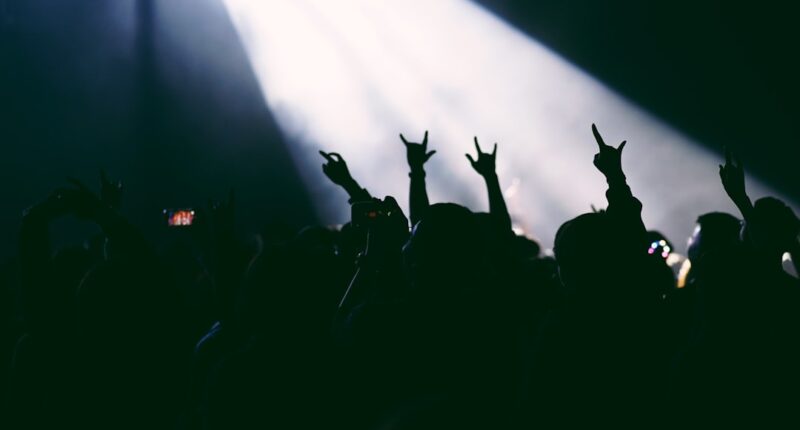Event marketing is essential to any music event’s success in the quick-paced, constantly-changing music industry. A big & enthusiastic audience can be drawn to any event, be it a concert, festival, or album release party, with the help of efficient marketing. This blog post will cover a variety of pointers and techniques to help you promote your music events like a pro. We will cover everything, from using social media to build your brand and promote your music. Now let’s get started and learn how to make your music events truly memorable.
Key Takeaways
- A music industry database is crucial for effective event marketing
- Music promotion can significantly increase event attendance
- Successful music event promotion requires strategic marketing strategies
- Music promo can help build your brand and increase brand awareness
- Crafting killer music event ads and utilizing social media are key to successful event marketing
Event marketing can benefit greatly from the use of a music industry database. It enables you to compile an extensive list of contacts in the business, including media outlets, artists, managers, and promoters. Effective event marketing requires the creation and upkeep of a database about the music business. This is the reason:1.
Find the Correct Audience: You can focus your marketing efforts on the correct demographic by using a Music Industry Database. You can make sure that your event promotions reach the people who are most likely to be interested by segmenting your contacts based on genre preferences, location, & other pertinent factors. 2. Personalized Communication: You can tailor your correspondence with industry experts by using a music industry database. Building a stronger relationship and raising the possibility of cooperation or coverage can be achieved by addressing them by name and customizing your communications to their particular interests. 3.
Possibilities for Networking: Access to a music industry database facilitates networking. Having a roster of contacts in the industry at your disposal facilitates reaching out to possible sponsors, partners, or collaborators for your musical events. Starting with going to industry events, making professional connections, & gathering business cards will help you create and manage a database of the music industry. To locate and get in touch with people in the industry, use professional directories and internet platforms such as LinkedIn. Make sure the data in your database is correct and up to date, and add new contacts on a regular basis.
| Metrics | Data |
|---|---|
| Number of attendees | 500 |
| Number of tickets sold | 600 |
| Number of social media impressions | 10,000 |
| Number of social media engagements | 1,000 |
| Number of email subscribers | 1,200 |
| Number of email opens | 800 |
| Number of email click-throughs | 200 |
| Number of sponsorships | 5 |
| Revenue generated | 20,000 |
Your events can be promoted in a variety of ways with the help of a music industry database. Professionals in the field should receive personalized invitations, special offers of benefits or discounts, and promotional materials to distribute to their networks. You can build excitement & interest in your music events by making good use of your database.
One of the most effective ways to increase the number of people who attend your music events is through music promotion. You can take advantage of the following music promotion methods:1. Radio Promotion: Reaching a large audience by having your music played on radio stations can help you promote your event. Make contact with online and local radio stations that play music that appeals to your target demographic and extend an invitation for them to host interviews or present artists from your event. This may arouse interest and motivate listeners to show up. 2. Streaming Services: The promotion of music now requires the use of streaming services like SoundCloud, Apple Music, & Spotify.
Make playlists with the musicians that will be performing at your event, then share them on your social media pages. Increase the visibility and reach of your playlist by working with well-known curators or influencers to feature it. 3. Social Media Promotion: Websites such as Facebook, Instagram, and Twitter can be used as effective means of advertising music events.
To create anticipation, create interesting content like artist interviews, behind-the-scenes videos, and sneak peeks. Promote your event on social media, use hashtags to keep people talking about it, and hold giveaways or competitions. 4. Partnering with music industry influencers can greatly increase the number of people who attend your event. These individuals have a large fan base.
Choose influencers who will benefit from the genre & target audience of your event, & provide them with special access or benefits in return for promoting it. Your event may draw in their fan base thanks to their support. Planning your campaigns strategically is essential to maximizing the impact of music promotion. In order to create excitement and build anticipation, start promoting your event well in advance.
Ensure that the brand image is unified and consistent throughout all platforms and promotional materials. To maximize the impact of your promotions, track their effectiveness and make necessary adjustments. The success of music events is greatly dependent on their marketing plans. The following techniques can be used to successfully advertise your musical events:1. Email marketing: Create a list of supporters and business associates, then periodically send out announcements about your events.
To entice recipients to buy tickets or tell their networks about the event, use attention-grabbing subject lines, tailored content, and obvious calls-to-action. 2. Produce interesting & educational material about your musical events for content marketing purposes. Artist interviews, podcasts, videos, and blog entries can all fall under this category.
In order to establish yourself as an authority and increase interest in your events, share this content on your website, social media accounts, and trade magazines. 3. Influencer marketing: Assist influential people who are well-known in the music business. They may offer exclusive content, encourage their followers to attend your events, or even perform live at the event.
Their support can greatly raise the profile & legitimacy of your event. 4. Collaborations and Cross-Promotion: Form alliances with companies or brands that cater to the target market of your event. To reach a larger audience, offer combined promotions or cross-promote each other’s events. Collaborations with nearby companies, performance spaces, or even other musical gatherings can fall under this category. It’s critical to identify your target market and adjust your messaging when developing marketing campaigns for your music events.
To draw in readers, use attention-grabbing images, interesting copy, and a strong call to action. Keep an eye on the success of your campaigns and tweak them as necessary to maximize their impact. Using music promotion to promote your music can help you establish your brand. To effectively use music promotion to develop your brand, follow these tips: 1.
Consistency: Keep your brand image consistent in all of your marketing collateral. This covers your website, merchandise, event posters, & social media accounts. To establish a unified and recognizable brand identity, use consistent fonts, colors, and images. 2. Narration: Craft a captivating brand story through music promotion.
Emphasize what makes your events special, the artists you collaborate with, & the experiences you hope to provide for guests. By sharing behind-the-scenes tales or testimonies from past attendees, you can emotionally connect with your audience. Three. Partnerships: Work together with influencers, artists, or other companies that share the same values as your brand and appeal to the same demographic. Collaborating on exclusive merchandise, showcasing artists in your marketing materials, or co-hosting events are a few examples of this.
You can reach a wider audience and gain more followers by working together. 4. Experience marketing: Using immersive and interactive marketing strategies, create experiences that your audience won’t soon forget. Pop-up events, interactive installations, and special event activations are a few examples of this. These interactions can strengthen attendees’ bonds with your brand and leave a lasting impression. You may develop a devoted following and make a name for yourself in the music industry by using music promotion to develop your brand.
Marketing for music events must include advertising. Top tips for making captivating music event advertisements are as follows:1. Know Your Audience: Recognize the people who make up your target market and adjust your advertisements to suit their tastes. Make use of images, sounds, and language that speak to them. While creating your advertisements, take into account their demographics, interests, & habits. 2.
It is important to maintain clarity and conciseness in your messaging. Make use of eye-catching headlines, captivating imagery, and a compelling call to action. Draw attention to the most important information about your event, like the date, venue, and lineup, in a way that is visually appealing. Three. Use eye-catching images that perfectly convey the spirit of your event to create visual appeal.
This can include images of creative people, vivid hues, or original patterns. Make sure the images you use are captivating and unique from the rest. 4. Multi-Channel Strategy: To reach a larger audience, make use of different advertising channels. Print advertisements in regional publications, digital advertisements on websites or social media, and outdoor advertisements in busy regions can all be examples of this.
To get the most out of your advertisements, customize them for each channel. 5. Test and Optimize: To increase your ads’ efficacy, test and optimize them frequently. Keep an eye on the effectiveness of your ads, measure important parameters like click-through rates or conversions, & adjust as necessary.
You can find the most effective ad elements with the aid of A/B testing. You can make captivating music event advertisements that pique the interest of your target audience and increase ticket sales by adhering to these best practices. Social media has completely changed how we interact with and market music events. The following advice will help you advertise your music events on social media:1. Select the Proper Platforms: Determine which social media sites are most well-liked by your intended audience. To increase your reach & engagement, concentrate your efforts on these platforms.
Sites such as Facebook, Instagram, Twitter, and TikTok can be included in this. 2. Engage Your Audience: Use social media to actively interact with your audience. React as soon as possible to mentions, messages, & comments. Organize competitions or ask guests to share their experiences with the hashtag #event to promote user-generated content. 3.
Employ live streaming services such as Facebook Live, Instagram Live, or YouTube Live to provide a preview of your event to your audience. Showcase live performances, exclusive behind-the-scenes videos, or artist interviews to build anticipation and boost attendance. 4. Influencer Takeovers: Assist artists or influencers to take over your social media pages for a single day. These may consist of in-person Q&A sessions, behind-the-scenes excursions, or unique content. You can expect a higher level of brand engagement and event attendance from their followers. 5.
Paid Advertising: To reach a larger audience, take advantage of social media platforms’ paid advertising options. This can involve influencer partnerships, targeted advertisements, or sponsored content. To maximize the effectiveness of your advertisements, establish clear objectives, specify who your target market is, and track their performance. A special chance to establish a personal connection with your fans & create a community around your musical events is presented by social media. You may build anticipation, create buzz, & boost attendance at your events by using social media wisely.
In the realm of music event marketing, influencer marketing has grown in strength. You can use influencer marketing to effectively promote your music events by following these tips:1. Choose Influencers Who Are Relevant: Choose influencers who are well-known in the music industry and who share the same demographic as the intended audience for your event. Seek out influencers with a devoted fan base and a sincere interest in your genre. 2.
Grant Influencers Exclusive Access: Provide VIP tickets, backstage passes, or meet-and-greet opportunities to influencers so they can attend your event without anyone else. Their followers may be encouraged to spread the word about your event and generate buzz as a result. 3. Work together to create authentic and interesting content about your event by collaborating with influencers. This can apply to sponsored videos, social media posts, and blog entries. Make sure the content speaks to the influencer’s audience and is consistent with your brand. 4.
Monitor and Evaluate: Monitor the outcomes of your influencer marketing initiatives to assess their efficacy. Keep an eye on important data points like engagement, reach, and ticket sales. You can use this data to pinpoint the influencers who will be most effective in the future and to improve your campaigns. Promoting your music events through influencers can greatly raise their profile & legitimacy. You can reach their devoted fan base and draw more people to your events by working with influencers.
Music event marketing benefits greatly from event sponsorship. Here are some pointers for obtaining partnerships with the music industry for your events:1. Find Possible Partners: Look for companies or brands that share the same values & target audience as your event. Find businesses who have a track record of supporting comparable events and who genuinely care about the music industry. 2.
Make a Strong Proposal: Craft a strong sponsorship proposal that emphasizes the advantages of collaborating with your event. Outline your exposure and promotional opportunities (logo placement, social media mentions, on-site activations, etc.) in clear & concise terms. 3. Adapt Your Strategy: Adapt your strategy to every possible sponsor. Examine their marketing goals, prior sponsorships, & brand.
Tailor your proposal to highlight the ways in which your event can assist them in achieving their objectives. 4. Provide Sponsors with Unique Experiences: Go above and beyond standard logo placement by providing sponsors with distinctive experiences. This may involve first access to performers, private events for VIPs, or branded activations.
Make your sponsors feel like they are an essential part of your event by giving them something of value. 5. Continue to Build Relationships: After submitting your proposal, get in touch with possible sponsors. Arrange conferences or phone conversations to go over the specifics & handle any queries or worries. Forging long-term alliances requires continuing to communicate with your sponsors even after the event.
Getting ink from the music industry can help your event financially, gain more credibility, & reach a wider audience. You can obtain worthwhile collaborations for your music events by skillfully contacting possible sponsors and providing distinctive experiences. Monitoring metrics is crucial for assessing how well your marketing efforts for music events are working. The following are some crucial metrics to monitor and the methods for doing so:1. Tickets Sold: Keep tabs on the quantity of tickets sold, earnings, & typical ticket cost.
This will provide you with a precise picture of the effectiveness of your advertising campaigns and the general turnout of your events. 2. Engagement on Social Media: Keep an eye on likes, comments, shares, and mentions on your social media accounts. This will assist you in determining how much excitement and interest your event promotions have generated. 3. Website Traffic: Monitor the quantity of people that visit your event’s website and their origins of traffic. This will enable you to determine which marketing channels are bringing in the most business and modify your plans accordingly. 4. Email marketing: Keep an eye on the conversion, click-through, & open rates of your campaigns.
You will gain knowledge about the degree of interest generated and the efficacy of your email promotions from this. 5. Media Coverage: Monitor any press releases, interviews, or reviews that are published about your event. You can use this to determine how much publicity and credibility your event has received. You can evaluate the effectiveness of your music event marketing campaigns and make data-driven choices to maximize your subsequent efforts by monitoring these metrics.
In summary, the field of music event marketing is dynamic and constantly changing. Attendance & engagement at your music events can be raised by putting the advice and techniques covered in this blog post into practice. Utilizing social media channels to advertise your event and interact with prospective attendees is a crucial piece of advice.
Buzz and excitement can be created by making captivating images and videos, releasing behind-the-scenes content, and holding competitions or giveaways. Also, you can reach a larger audience and increase your reach by collaborating with local musicians or influencers. Offering distinctive experiences or rewards, like VIP access or premium merchandise, is an additional tactic to encourage ticket sales. Reaching new audiences and cross-promoting your event can be facilitated by partnering with nearby companies or groups.
Remember the effectiveness of email marketing as a final point. Creating a robust email list and sending targeted, personalized emails to previous attendees can help maintain relationships and entice them to return to future events. Your music events can be successfully marketed and successful by using email marketing, staying current with industry trends, utilizing social media, providing unique experiences, and offering these strategies.
If you’re looking for expert advice on music event marketing, look no further than Music Promotion Tech. They have a wealth of knowledge and resources to help you promote your next music event successfully. In fact, their article titled “The Ultimate Guide to Music Event Marketing” is a must-read for anyone in the industry. It covers everything from creating a compelling event concept to leveraging social media and online platforms for maximum exposure. Don’t miss out on this valuable resource – check it out here!
FAQs
What is music event marketing?
Music event marketing is the process of promoting and advertising a music event to attract attendees and increase ticket sales. It involves various marketing strategies such as social media, email marketing, influencer marketing, and traditional advertising methods.
What are the benefits of music event marketing?
Music event marketing helps to create awareness about the event, increase ticket sales, and attract a larger audience. It also helps to build brand recognition and loyalty, and can lead to increased revenue for the event organizers.
What are some effective music event marketing strategies?
Some effective music event marketing strategies include social media marketing, email marketing, influencer marketing, content marketing, and traditional advertising methods such as billboards, flyers, and radio ads.
How can social media be used for music event marketing?
Social media can be used to promote music events by creating event pages, sharing event updates and announcements, running social media ads, and partnering with influencers to promote the event to their followers.
What is influencer marketing in music event marketing?
Influencer marketing in music event marketing involves partnering with social media influencers who have a large following in the music industry to promote the event to their followers. This can help to increase awareness about the event and attract a larger audience.
What is content marketing in music event marketing?
Content marketing in music event marketing involves creating and sharing valuable content such as blog posts, videos, and podcasts to attract and engage potential attendees. This can help to build brand recognition and loyalty, and increase ticket sales for the event.





